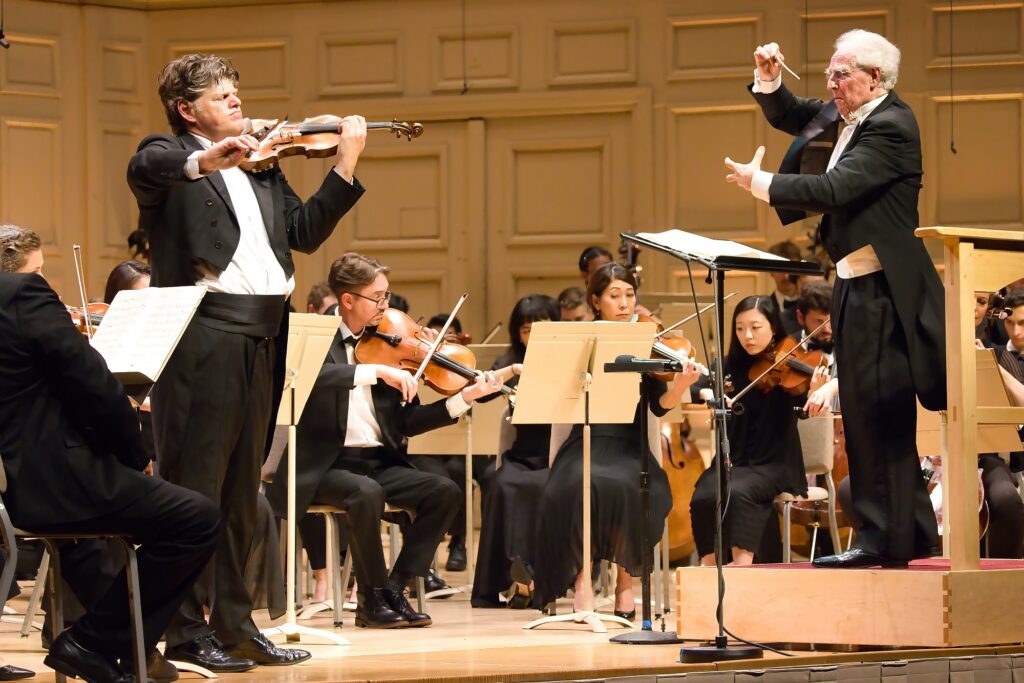Zander, BPO off at a gallop for 45th season

Guy Braunstein performed Elgar’s Violin Concerto with Benjamin Zander and the Boston Philharmonic Orchestra Friday night at Symphony Hall. Photo: Hilary Scott
At the start of their 45th season, the Boston Philharmonic Orchestra shows no signs of slowing down in their proverbial middle age. Benjamin Zander, their founder and sole conductor all these years, is as spry and passionate as ever at age 85 on the podium.
The concert opened with the Overture from Rossini’s William Tell, best known for a famous fast melody, used as the theme song of The Lone Ranger. It’s easy to forget that the piece actually takes the audience through several different musical moods before busting out of the gate. The dark, opening cello chorus — deftly handled by principal cellist Rafael Popper-Keizer and colleagues — guides the listener through a dense environment of minor-key figures before bringing the rest of the orchestra in for a sweet musical sunrise, and finally to that well-known horsey theme.
Zander chose a slightly more stately tempo for the main theme that didn’t make the audience feel like the horses were about to crash, but that still got several audience members, children and adults, bouncing along with the iconic rhythm.Guy Braunstein was the solo protagonist in the evening’s centerpiece, Elgar’s Violin Concerto. The soloist rocked out, dancing his tall frame around his space on stage. He dug into his instrument to coax strong low notes and drew stark yet precise contrasts between the intense, faster parts of the music and the lighter, floaty phrases.
Despite his admirable performance and the BPO’s strong backing, this performance did not make a strong case for this particular concerto. While generally infused with the Elgar’s lyricism it’s distinctly lacking in indelible tunefulness, leaving the performers with no real musical hooks. The BPO and Braunstein shaped the peaks and valleys of the piece well, but in the end, it wasn’t much of a view.
The real high point of the concert, however, came directly after the concerto when the audience called Braunstein back onstage for an encore. Explaining to the audience in his lilting Israeli accent that when the Black Lives Matter protests shook the world — including in Berlin, close to where he lives — he was inspired to do something. “As you can hear, I’m not very good with the talking,” he joked to an appreciative laugh, “so I took a piece of paper and a pencil into my studio, and by the next sunrise this is what I came up with.”
The “this” was six solo variations on “Blackbird,” the song by John Lennon and Paul McCartney, that Braunstein arranged himself, ranging from the dark and intense to the bright and virtuosic. Stripped down to its bare minimum, the familiar tune became a sparkling multi-faceted gem that the audience could admire from all sides as Braunstein turned it over in his capable hands.
Beethoven’s Seventh Symphony rounded out the concert and gave the BPO a chance to flex its range. They rolled through the landscape of the first movement with ease and into the distinctive, edgy second movement. Interestingly, Zander chose a slightly faster tempo for the second movement, which, rather than basking in the natural built-in tension of that moment as many conductors love to do, had the effect of softening the sharp edges of the piece and giving the music an overall more hopeful sheen.
Zander’s tempo choices brought new colors and interpretations to a familiar Beethoven piece. It is small musical decisions like this that can turn an old warhorse of a piece into something fresh and new, a trick that Zander and the BPO surely have more of up their sleeve this season.
The Boston Philharmonic Orchestra returns to Symphony Hall, 8 p.m. November 17 with Bartok’s Piano Concerto No. 3 with Benjamin Hochman and Shostakovich’s Symphony No. 10. bostonphil.org
Posted in Performances